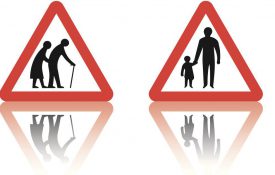-

Older Adults Are Bigger Risk Takers in High-Poverty Countries
People’s propensity to take physical, social, legal, or financial risks typically decreases as they age, but not in countries with high poverty and income inequality, according to new research published in Psychological Science, a journal
-
New Research From Psychological Science
Read about the latest research published in Psychological Science: Neural Discriminability of Object Features Predicts Perceptual Organization Emily J. Ward and Marvin M. Chun In this study, participants viewed objects that varied in color, shape, and orientation while undergoing functional magnetic resonance imaging (fMRI). Participants then performed a perceptual grouping task outside of the scanner, using the same objects as in the fMRI task. The researchers found that activity patterns in the lateral occipital cortex -- an area of the brain involved in high-level vision -- discriminated between the different object features.
-
Lead Exposure Linked to ADHD in Kids with Genetic Mutation
Exposure to miniscule amounts of lead may contribute to ADHD symptoms in children who have a particular gene mutation, according to new research published in Psychological Science, a journal of the Association for Psychological Science. “This research is valuable to the scientific community as it bridges genetic and environmental factors and helps to illustrate one possible route to ADHD. Further, it demonstrates the potential to ultimately prevent conditions like ADHD by understanding how genes and environmental exposures combine,” says lead researcher Joel Nigg, professor of psychiatry and behavioral neuroscience at the OHSU School of Medicine.
-
New Research From Psychological Science
Read about the latest research published in Psychological Science: Opportunity Cost Neglect Attenuates the Effect of Choices on Preferences Adam Eric Greenberg and Stephen A. Spiller When someone makes a decision, the cost of not choosing the second-best alternative is called the opportunity cost. In some cases, such as in "whether-or-not" decisions (e.g., to go to a movie or not), opportunity costs may not be apparent, whereas in others, such as "which-one" decisions (e.g., whether to go to a movie or go to a play), they are made explicit.
-
Protecting a Few Students from Negative Stereotypes Benefits Entire Classroom
Interventions targeted at individual students can improve the classroom environment and trigger a second wave of benefits for all classmates, new research shows. The findings, published in Psychological Science, a journal of the Association for Psychological Science, indicate that sharing a classroom with greater numbers of students who participate in a brief intervention can boost all students’ grades over and above the initial benefits of the intervention. “Our results suggest that the whole effect of an intervention is more than the sum of its individual effects,” explains psychological scientist Joseph Powers of Stanford University, lead author on the study.
-
New Research From Clinical Psychological Science
Read about the latest research published in Clinical Psychological Science: The Effects of Attachment Priming on Depressed and Anxious Mood Katherine B. Carnelley, Lorna J. Otway, and Angela C. Rowe Attachment theory suggests that people internalize the quality of early interactions with their primary caregivers, forming an attachment orientation that influences their perception of social interactions throughout their lives. Attachment insecurity has been associated with depression and anxiety; however, the evidence for this link is correlational.

